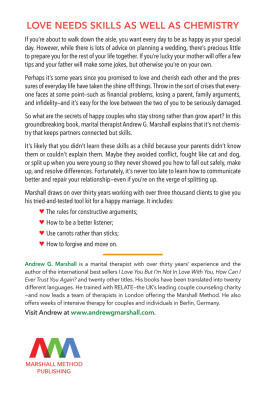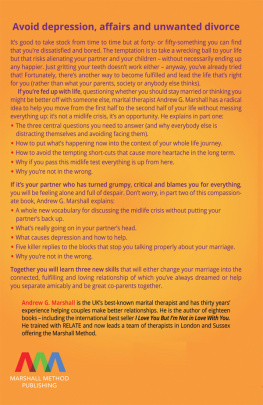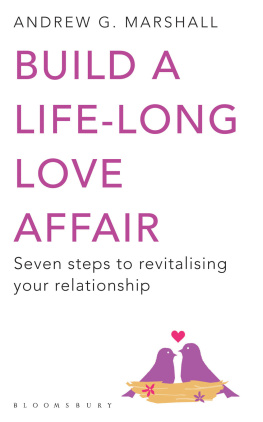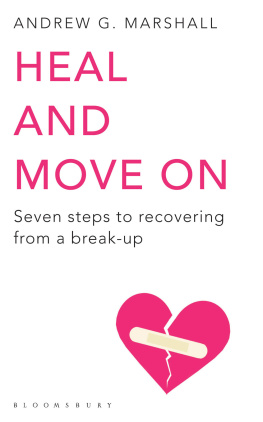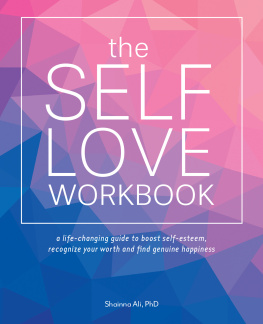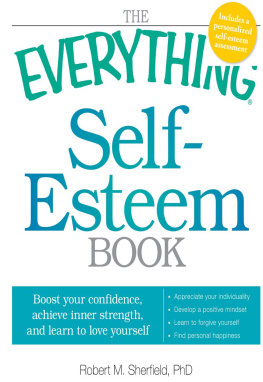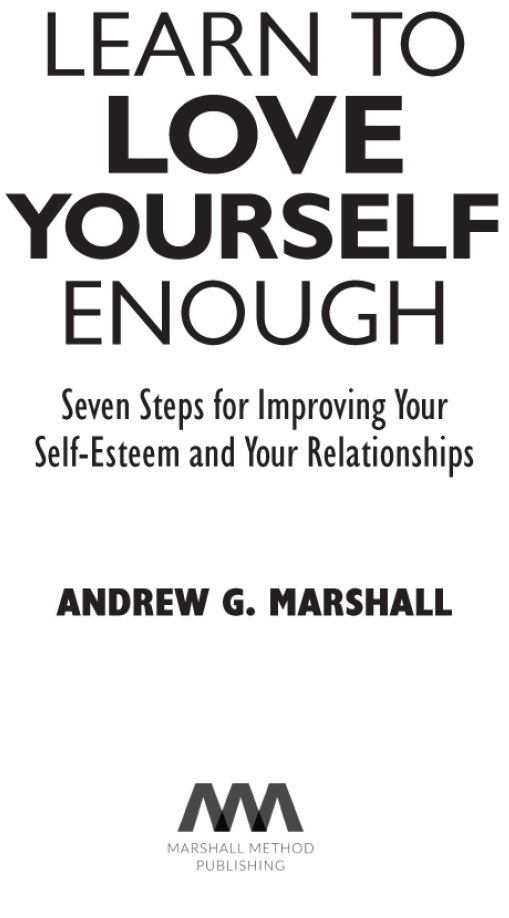
www.marshallmethodpublishing.com
The case histories in this book are based on couples with whom I have worked in my marital therapy practice (their identities have been changed to protect confidentiality, and sometimes two or three cases have been merged together) and individuals who have written to me via my website.
Marshall Method Publishing
London Florida
www.marshallmethodpublishing.com
Library of Congress Cataloging-in-Publication Data is available through the Library of Congress.
ISBN-13: 978-0-9574297-8-9 (Paperback)
ISBN-10: 0-9574297-8-9 (Paperback)
ISBN-13: 978-0-9574297-5-8 (ePub)
ISBN-10: 0-9574297-5-4 (ePub)
Copyright 2014 by Andrew G. Marshall
All rights reserved. No part of this book may be reproduced, stored in a retrieval system, or transmitted by any means, electronic, mechanical, photocopying, recording, or otherwise, without written permission from the author.
Cover and interior design: Gary A. Rosenberg
www.thebookcouple.com
ePub created by Dawn Von Strolley Groce
Printed in the United States of America
10 9 8 7 6 5 4 3 2 1
Contents
Chapter One
Understand the Problem
Chapter Two
Let Go of the Past
Chapter Three
Dont Let Other People Put You Down
Chapter Four
Reprogram Your Inner Voice
Chapter Five
Set Realistic Goals
Chapter Six
Rebalance Yourself
Chapter Seven
Conquer Fears and Setbacks
SEVEN STEPS IS A SERIES OF BOOKS offering straightforward advice for creating successful and fulfilling relationships. Getting the most out of love needs skills and the good news is that these skills can be learned.
If there is critical voice in your head that not only puts you down but makes it hard to accept praise from work colleagues, friends or family, this book will help you make peace with yourself and the world around you. Unlike many programs for boosting self-esteem, I will not just treat the symptoms but go to the root causes of your negative messages and show how to deal with the past. In this way, you will not only learn how to challenge that little negative voice in your head, but also replace it with something kinder, more understanding and loving. Most importantly, by improving your relationship with yourself, you will improve all your relationshipsso that if youre looking for love, you will start attracting people wholl treat you better (rather than play games) and if youre in a loving relationship, it will become more equal and balanced.
In devising this program, I have drawn on almost thirty years experience as a marital therapist. However, I have changed names, details and sometimes merged two or three of my clients stories to protect their identity and confidentiality.
Andrew G. Marshall
www.andrewgmarshall.com
IT IS A COMMON PIECE OF ADVICE youve heard it a million times on talk shows and from friends and family: Youve got to love yourself before you can love anybody else. There are also variations on this theme like: If you dont hold yourself in high regard, nobody else will and Loving yourself is the greatest love of all. In fact, weve heard this basic idea packaged in so many ways, so many times, that we tend to tune it out and carry on as normal. But what would our lives be like if we did at least like ourselves? Wouldnt everything be easier, and certainly more enjoyable, if we werent so self-critical? Wed start standing up for ourselves and stop friends or work colleagues from taking advantage. When looking for love, wed make better choices or when wed found a partner not let him or her walk all over us. Unlike a lot of other obvious truths, there is a real nugget of wisdom in the idea of loving ourselves. So why havent we taken the advice to heart?
From time to time, I do meet people who seem to have a very high opinion of themselves. Im only attracted to really handsome men, said Charlotte, forty-two when she arrived in my counseling office. Unfortunately theyve all known just how gorgeous they were. As I took down her relationship history, Charlotte peppered her conversations with examples of just how much she loved herselfIm used to a lot of attentionor had been loved: He absolutely adored me and would have done anything for me.
Twenty-five years of counseling has taught me that how something appears on the surface and the reality underneath are often very different. At first sight, Charlotte did seem confident and up-front. However, she felt a little brittle, as if the slightest setback or anything less than 100 percent approval and she would start to crumble. She had come into counseling because despite being able to attract plenty of men, she could not keep any that she truly wanted (and did not seem to want the ones who wanted her). The more I got to know Charlotte, the more I realized that she was swinging from high to low self-esteemwith nothing much in the middle.
The effects of low self-esteem are all too evident in my counseling office. Jessica, thirty-four, wanted a long-term boyfriend but most of her relationships never seemed to go anywhere. She sighed heavily and looked down at the floor: Im a complete failure with men. Ill meet these guys at parties and well click but somehow the relationships always end with me crying. So I asked about her most recent boyfriend, Bob. I suppose I should have known better. That first night, when we were back at my apartment on the sofa with a glass of wine, he said, Are you sure you want to do this? Hed even told me he was not looking for a relationship. But I didnt want him to go. Well, the inevitable happened and we made love. It was good and I developed feelings for him. In effect, she had known that they were after different things: he was looking for casual sex and she wanted love. However, as she did not treat herself with respect, Bob probably felt that he had the green light to do the same. After half a dozen encounters, he became less and less available and eventually disappeared altogether.
Loving yourself enough
This concept comes from child care where experts have always known that if a baby is neglected, he or she will not only fail to thrive but also grow into a troubled and unhappy adult. Holding the destiny of your baby literally in your arms is a huge responsibility. Many new mothers feel overwhelmed and worry that anything less than perfection will cause lasting damage.
Fortunately, in the fifties, Donald Winnicott (an English pediatrician and psychologist) coined the term good enough mother. This mother provides enough care for her baby to prosper but unlike the perfect mother does not provide everything that their child wants immediately, on demand, around the clock. Winnicott believed that if, by some miracle, we fulfilled every one of our childrens needs, they would not develop properly and find it difficult to grow into self-sufficient adults. In effect, small but manageable amounts of adversity provide important lessons for children. To modern minds, good enough is often seen as not good enough. We aim to do the very best for our children and then a little bit more. However, Winnicott would argue that we are not only driving ourselves mad but also failing our children.
So how does the good enough concept work with self-esteem? Unlike a lot of programs, I will not be trying to boost you up with lots of self-improving statements or visualizing the ideal outcome. To my mind, this is like trying to be a perfect person and makes someonelike Charlotteswing between loving themselves too much (and walking over everybody else) or hating themselveslike Jessicafor failing to achieve goals (and probably ending up being taken advantage of by others). Instead, my goal is to teach you to love yourself enough: enough to have love to offer others; enough to be open to receive love from others.


